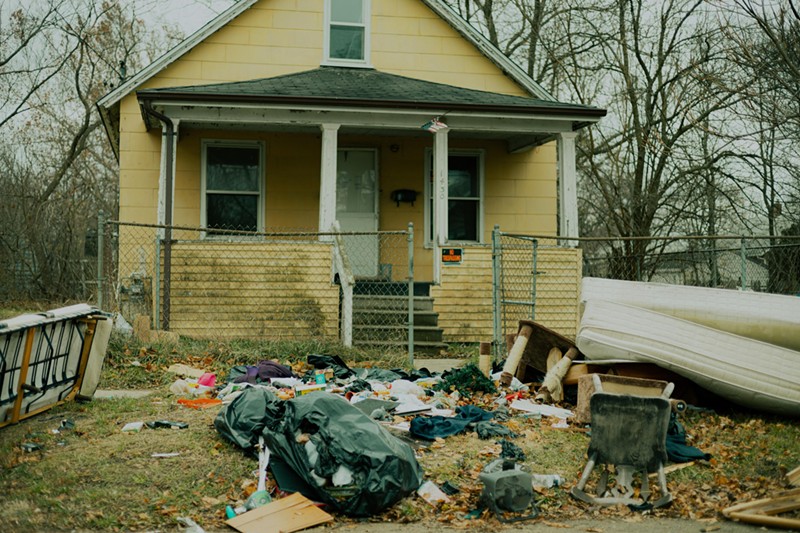The building’s fire alarm was deactivated. Offices were converted into living quarters. Cameras were removed. Liquor bottles were strewn about. And it all happened under the city’s nose.
Located a block from City Hall, the city-owned building that formerly housed the Family Gateway Resource Center took less than a year to fall into complete disrepair. The building was vacated in summer 2023 in “completely clean” condition, a statement by Family Gateway said, and was vandalized, infested with bugs and covered in trash and human feces in the months it sat empty. By the time police entered the facility last month, at least 20 individuals, some with animals, had made the abandoned building into their home.
A gate leading to the building’s outdoor playground had been left unsecured, said council member Jesse Moreno, who chairs the Housing and Homelessness Solutions Committee and whose district includes the building, in a memorandum about the building’s condition. While working on an unrelated project aimed at mitigating homelessness on South St. Paul Street, he learned of individuals living in the center, leading to a facility walkthrough that left him “gravely concerned.”
“Signs of long-term living conditions were seen, including a makeshift iron, an air conditioning unit, and various clothes and sundries. The bathroom toilets were clogged and nearly overflowing with feces and urine,” the memo states. “Evidently, there were signs of living conditions on the roof, including a workout bar, chairs and toys.”
Moreno told the Observer he plans to hold the city accountable for properly securing, cleaning and monitoring the facility and for preventing the disrepair from happening in other city-owned facilities. But the conditions that come with unauthorized visitors inhabiting a property is not a new phenomenon.
"I believe that squatting is a significant issue that our residents have experienced," Moreno told the Observer. "I expect that our city staff will pursue all options available to them under the law to ensure quality of life for our residents, including the protection of their own property from criminal acts."
The problem of squatting is one the Texas Legislature plans to take up in the 2025 legislative session. Lt. Gov. Dan Patrick charged the Senate Committee on Local Government with tackling the statewide problem of “squatters,” people who occupy a property without the owner’s knowledge or consent and who are often difficult to legally remove once discovered.
Squatting Addressed on the State Level
Twenty minutes into the Senate Committee looking into squatting, state Sen. Lois Kolkhorst was “outraged.” Residents from across Texas spoke at the hearing, sharing “alarming” tales of homes being taken over by uninvited tenants. One Mesquite resident told the committee about her possessions being sold in a yard sale while she was in Florida caring for her ailing mother. A San Antonio property owner told legislators she came face to face with a weapon while conducting an inspection of units she believed to be empty.
“I invited the public from all over the state to tell their horror squatter stories and proposed solutions. This should not be happening in Texas,” said state Sen. Paul Bettencourt, who chaired the hearing. “We are going to make it easy for homeowners and business owners to ‘Come and Take it Back’ from squatters."
Legislators want to clarify the laws surrounding squatting to make it easier for victimized homeowners to receive legal assistance and aid from law enforcement. Because the state does not have a legal definition for squatting, legal loopholes — such as debates over whether squatting is a civil or criminal matter — have left many homeowners unable to quickly reclaim their property. In most instances, property owners are left with no choice but to engage in an eviction process with the illegal inhabitants, a process that is as lengthy as it is costly.
In Texas, anyone "squatting" in your home is breaking the law.
— Greg Abbott (@GregAbbott_TX) March 29, 2024
They are criminals violating TX laws like criminal trespass & criminal mischief (Tex. Penal Code 30.05 & 28.03).
Also, the Texas Castle Doctrine empowers Texans to use force to defend themselves & their property.
David Howard, executive director of the National Rental Home Council, told the committee a recent survey revealed nearly 500 ongoing instances of squatting in the Dallas-Fort Worth area. Bettencourt said data from Harris County law enforcement led him to believe there could be as many as 10,000 squatting cases in the state currently.
A spokesperson for the Dallas Police Department told the Observer that squatting cases are not tracked by the department, but charges of burglary or criminal trespass could be used to address a squatter at a Dallas property.
In a message recently posted to X, Texas Gov. Greg Abbott said squatters are “breaking the law,” and Texans are entitled to “use force to defend themselves and their property.”
Squatting Cases in North Texas
In the state hearing, Mesquite resident Terri Boyette talked about her experience with hiring a handyman who later broke into her home after she left the state for several weeks to deal with a family emergency. While she was out of town, a friend tasked with picking up Boyette’s mail called to notify her a man was living in the house.
Boyette said the squatter turned her home into a “drug den” and sold her belongings in a yard sale. After calling Mesquite police about the matter, she was told the issue was a “civil” one. It took nearly a year before the man was evicted from the home, Boyette said.
"That’s a bunch of crap," Texas Sen. Royce West said after Boyette’s testimony. State senators said they are now summoning local law enforcement to explain their handling of squatting cases.
Earlier this year, a U-Haul truck parked outside of a Colleyville home for “weeks” raised neighbors suspicions. When Colleyville police arrived at the home, they found an adult and several children squatting, NBCDFW reports. The adult male was arrested by police, but for felony credit card abuse.
In 2023, a North Texas couple found their Rowlett home trashed, but empty, after months of dealing with a “serial squatter.” After receiving a job transfer to Florida, Jessica and Colin Davis decided to rent their home to a woman who gave the name Rayes Ruybal. After Ruybal moved into the home, the first month's rent and security deposit sent to the Davises bounced, and the couple discovered they were dealing with a pro.
"I feel like this could have been dealt with earlier if the Dallas County and Rowlett Police did not ignore my calls for help." — Jessica Davis, property owner in Rowlett
tweet this
The woman, whose real name is Heather Schwab, has squatted in homes across Texas and Colorado for years, and even served jail time in Colorado. While Schwab was living in her home, Jessica Davis told CBS she felt police were “protecting” the woman after refusing to aid in an eviction. By the time Schwab fled the property, rotted food, cigarette butts and even “pee in [a] bottle” were found in the home. In October 2023, a felony warrant was issued for Schwab’s arrest.
“Even though I am happy that there is a warrant for Heather’s arrest, I feel like this could have been dealt with earlier if the Dallas County and Rowlett police did not ignore my calls for help, my proof of fraud, and my wants on filing a report on Heather at the beginning,” Jessica Davis told Fox News Digital.
In 2021, East Dallas resident Mary Glenn published an essay in D Magazine about the “nightmare” of dealing for nearly a year with a squatter who forged leasing paperwork and invented a landlord to help stall eviction efforts. Glenn and her husband discovered the squatter after buying a home for her aging father-in-law. The ordeal was made even worse by the fact that it was during COVID, and all city processes were ground to a near halt. Still, Glenn did her best to navigate the unclear channels for a legal eviction. Here’s an excerpt of her experience on that front:
One day in June, I was researching eviction processes, and I called the court in which we’d filed, as I did every week, sometimes twice a week, to see if we were any closer to getting on the court’s docket. Most of the time, the phone would just ring and ring and ring. If I did get someone to answer, he’d tell me nothing was happening. You know, because we are in COVID World. Well, this day in June, the clerk answered and said, “Ma’am, it looks like you had a hearing yesterday, but it was dismissed for want of prosecution.” “What? No, that can’t be correct,” I said. He repeated, yes, the hearing had been the previous day, and now the case was dismissed because no one had shown up. “Wait a second,” I said. “We were never told! I call here every week! And my attorney does, too! You all never even answer the phone!” “Sorry,” he said, with no explanation, and hung up.
Bettencourt said the local government committee will lay the groundwork for the Legislature to enact stricter criminal penalties and develop a clear legal definition of squatting in the upcoming legislative session.












